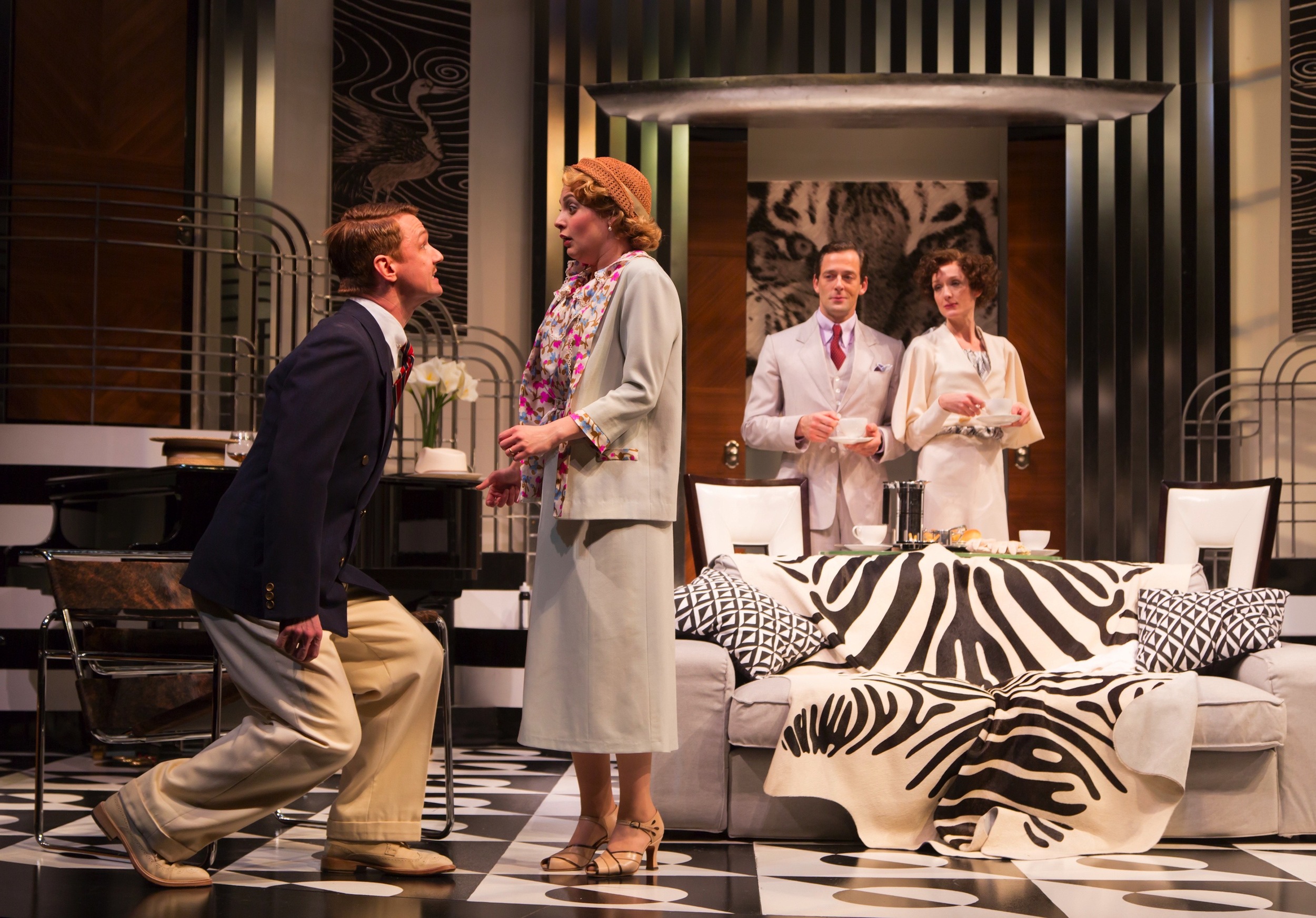Review of Private Lives at Hartford Stage One of the most successful aspects of Darko Tresnjak’s production of Noël Coward’s Private Lives, now showing at the Hartford Stage, is how well cast it is. Ken Barnett and Rachel Pickup play Elyot Chase and Amanda Prynne, a former couple married to others as the play opens. In the roles originally written for Coward and his wife Gertrude Lawrence, Barnett and Pickup display tons of smooth aplomb, looking every inch as sophisticated as, I’m sure, the originals did.
Coward’s comedy depends upon the tensions that arise when sophistication meets farce. Even the interwar years among the privileged elite must meet with put-downs and comeuppances—here, the belligerent and bored maid Louise (Carine Montbertrand) at Amanda’s flat in France has to stand for all the surliness directed at these posh couples by the underclass. And crowd pleasing she is, though, in this play, most of the deflation and rough patches come, fittingly, from private life: the mismatch of a couple, and the struggle of wills over what tone should prevail, what kind of union a marriage should be.
On an elegant terrace among other elegant terraces on the Riviera, we first meet Elyot with his new, blonde bride Sybil (Jenni Barber). It isn’t that they seem ill-matched, only that Sybil will be going on about Elyot’s former wife. No matter how archly Elyot fields her questions, an undercurrent of unease can’t quite be smoothed away and he begins to bristle. Some things are best not discussed between newlyweds. The couple withdraws and who should appear on the adjacent terrace but Amanda and her new husband Victor Prynne (Henry Clarke). While not suffering from quite the degree of second-spouse anxiety as Sybil, Victor clearly feels he has to dispense with any notion that he’s the runner-up. The comedy in the early going is all in the attempts at bonhomie by these not so tranquil couples.
We feel both Elyot and Amanda’s relief at not having to be their old selves, embraced by the excitement of new loves, yet it is obvious that something is lacking. When, alone on their respective terraces, Elyot and Amanda meet again, their “meant for each other” status is only too apparent. Barnett and Pickup simply match: their voices, their mannerisms, their use of language—both verbal and body—mesh and seem to demand a re-union despite whatever reason may dictate, which would bend to notions of wedlock and new vows. Barnett is dapper without seeming effeminate, contained, cool, dry, wearing a tuxedo as if he’s always lived in one. Pickup, wearing a period gown with great panache, makes the most of long, expressive arms that turn her every gesture into a grace note. In some ways, the play never quite recovers from the close of Act I. Seeing the former Mr. and Mrs. Chase reunite behind the backs of their more average and earnest current spouses satisfies with the snap of a well-mixed martini. What more is there?
Act II and III take place at Amanda’s flat, a rather delightfully garish mélange of patterns and hyper-modernist design. Here Elyot and Amanda, in flight from their current marriages, take their ease and pick holes in one another’s attitudes as only each can. It’s diverting, the slings and arrows of this well-matched sparring, with plenty of flinging about in appealing attitudes on various furnishings. Tresnjak makes the most of the physical grace of his actors as they fully own the space with the kind of theatrical ease that seems bred into these characters, with Barnett, in a dressing-gown throughout Act II, pounding away on a piano with much expressiveness, and Pickup, in a fit of pique, cracking a gramophone record against his head with finesse. Act II ends, as both the audience and the characters fully expect, with the arrival of Sybil and Victor, looking like well-meaning travelers seeking asylum in a madhouse.
Act III primarily affords a pleasure rarely encountered. With Elyot and Amanda, we are able to witness exes making a partnership, a match in its way as passionate as their own. As Sybil, Barber has at times the whine of a flighty child that she uses well to importune, while Clarke, as Victor, is brash and physical, looking to get into a fight with Elyot to prove his manliness. Everyone is pitch perfect, and wonderfully styled and costumed.
Beautiful to look at, swift in running-time, sumptuously staged, Private Lives delivers a fluffy divertissement with the quaint crackle of old-style Hollywood comedy. It’s a world where the British are still the height of style and the globe-trotters of a world they’ve colonized and thus feel blithely at home in. Coward lets us look in on these private lives with a certainty about the fascination that the masses still find in the contemplation of the rich and classy. Tresnjak and company manage to make a period piece come alive with the satisfying theatricality of the “private” made public, exulting in the kind of dialogue that seems to know it’s in a play because, well, aren’t we all, darling?
Private Lives By Noël Coward Directed by Darko Tresnjak
Scenic Design: Alexander Dodge; Costume Design: Joshua Pearson; Lighting Design: York Kennedy; Sound Design: Michael Miceli; Wig Design: Mark Adam Rampmeyer; Casting: Binder Casting, Jack Bowdan, CSA; Dialect Coach: Gillian Lane-Plescia; Fight Director: J. Allen Suddeth; Production Stage Manager: Robyn M. Zalewski; Assistant Stage Manager: Brae Singleton; Dramaturg: Elizabeth Williamson; Production Manager: Bryan T. Holcombe; Associate Artistic Director: Maxwell Williams
Hartford Stage January 8-February 8, 2015



